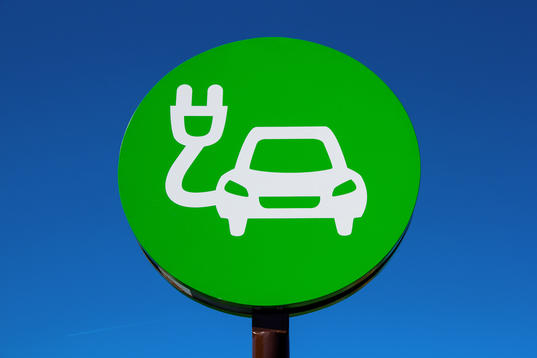Just a few years ago, the idea of achieving 100% electrification of light-duty on-road transportation, let alone having major corporate players publicly support strong electric vehicle (EV) policies, was just a dream. Fast forward to 2021, and that dream is becoming more of a reality, and at an accelerated rate.
More major Fortune 500 companies and others are committing to EV100 and converting their fleets and networks to electric by 2030. EV100, our corporate leadership initiative to drive the EV transition, represents a significant piece of the pie in the US transportation sector. When it comes to on-road vehicles, EV100 is instrumental given roughly 20% of all new vehicle purchases in the US come from companies, with an even greater market share in Europe reaching 59%. Additionally, the impact that company fleets have on the secondary EV market is critical as company fleet EV turnover can happen more rapidly than for individuals and accelerate growth for the secondary market.
Since companies significantly affect what on-road transportation looks like in the US, just what are EV100 members achieving through their commitments in 2021 and beyond? Globally, to date of publication, the 2021 EV100 Progress and Insights Report showcases 102 members have committed nearly five million vehicles to convert to electric by 2030. They’ve already deployed 170,000 EVs, which is an 111% increase from last year. In the US alone, EV100 members have already deployed over 46,000 EVs, 246 charging locations, and 2001 charging points, making the US one of the top markets globally for charging point installation within EV100.
While EV100 members are actively working to convert their fleets and deploy charging, they can’t go at it alone. Supportive policies are crucial to accelerating the transition to a 100% electric transportation future. EV100 members continue to cite the uncertain and underdeveloped policy landscape for EVs as one of five top barriers for EV adoption. As transportation is the leading source of emissions in the US, transitioning to zero-emission transportation would significantly reduce emissions, improve the air quality in all communities, especially low-income communities, create economic prosperity, and provide the US added global competitiveness in a highly competitive industry. Implementing sound transportation electrification policies is necessary to improving the quality of life for all.
“With 40,000 employees working across infrastructure, manufacturing, healthcare and transportation, Siemens USA is proud to be part of EV100 and is committed to electrifying our own fleet among other bold decarbonization efforts. In order to support cities across the country meet their climate goals, we are delivering critical eMobility technologies out of our manufacturing hubs in North Carolina, Georgia, Texas, and California. Siemens USA stands ready to work with Congress and the Federal government to advance equitable and competitive policies to ensure the U.S leads the world in electrification.”
“With 40,000 employees working across infrastructure, manufacturing, healthcare and transportation, Siemens USA is proud to be part of EV100 and is committed to electrifying our own fleet among other bold decarbonization efforts. In order to support cities across the country meet their climate goals, we are delivering critical eMobility technologies out of our manufacturing hubs in North Carolina, Georgia, Texas, and California. Siemens USA stands ready to work with Congress and the Federal government to advance equitable and competitive policies to ensure the U.S leads the world in electrification.”
With the new federal administration and continuing state leadership, 14 EV100 members including companies such as Siemens and DHL, have come together to propose key policy advancements to accelerate the EV industry. Among the comprehensive set of proposals in the new position paper Key Policies to Drive the Electric Vehicle Transition in the US, EV100 members state the crucial need for the US to be more ambitious and end the debate on EVs by setting a target of 100% zero-emission vehicle (ZEV) sales for new light-duty vehicles ideally by 2030. Such an action would establish a clear signal of where the market is heading and align the US with other national leaders, like the UK, who have done the same. As we approach COP26, where attention will be on the US as the nation reestablishes its global leadership on climate, this decisive action is expected and would be well received. Most importantly, based on recent analysis done by Climate Action Tracker, such action is necessary for the US to be compatible with the Paris Climate Agreement’s 1.5˚C temperature limit.
“In March 2021, DHL announced a new sustainability roadmap which will accelerate our journey to decarbonization. Maximizing the number of electric vehicles in our last-mile delivery fleet by 2030 is a central element of that roadmap, and we therefore welcome any measures that will increase the availability of ZEVs. Decisive policy action from national governments can undoubtedly move us towards a market in which ZEVs accounted for 100% of sales by 2030, which in turn would allow us to achieve this important milestone on the road to zero emission logistics.”
“In March 2021, DHL announced a new sustainability roadmap which will accelerate our journey to decarbonization. Maximizing the number of electric vehicles in our last-mile delivery fleet by 2030 is a central element of that roadmap, and we therefore welcome any measures that will increase the availability of ZEVs. Decisive policy action from national governments can undoubtedly move us towards a market in which ZEVs accounted for 100% of sales by 2030, which in turn would allow us to achieve this important milestone on the road to zero emission logistics.”
Corporate EV action is accelerating at a rapid pace and EV100 members are leading the way. However, now more than ever before, as we continue along the Climate Decade and work towards achieving net-zero by 2050, government support is critical to achieving 100% ZEV sales for new light-duty vehicles ideally by 2030. By working together, businesses, government, and individuals can lead this transition to a cleaner transportation future where no one is left behind.
